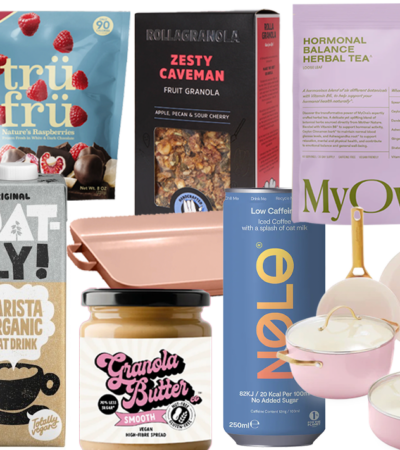Are your unpredictable and irregular periods causing you hassle? As much as they are “irregular” it’s certainly more common than you think. The female health experts at her1, explain five lifestyle hacks that could make all the difference. From lowering stress, fixing poor sleep to changing the way your workout, here’s what you can try to make your periods more regular.
Get LIT and switch to Low-Intensity Training
Over-exercising is a common factor that may have put your cycle out of sync. Participating in high-intensity training is fantastic, but if you are training like that all the time, rather than the recommended twice or maximum three times per week, with little or recovery, then problems will arise. In plain terms, the body gets burned out from doing too much and resting too little and has no energy to produce an egg. It simply doesn’t feel in a safe state to get pregnant when put under so much stress. Moving away from HIT training and replacing it with lower intensity and lower impact activities like yoga, mobility focused workouts, Pilates and even light walking might be the best forms of activity to switch to, for your body to get back to a less stressed state.
De-stress and practise self-care
Stress, anxiety and a hectic lifestyle can cause the body to release stress hormones like cortisol (part of the body’s fight or flight response). Chronic stress is particularly damaging since it causes hypothalamic-pituitary-adrenal (HPA) axis dysregulation, which can disrupt the production of estrogen and cause irregular periods. Remedy this by giving yourself a break and time out for relaxing activities like reading, cooking, taking a hot bath or getting a massage to allow the body to tap into its parasympathetic rest and digest state. Starting a stress journal might also be useful to track stress and help bring awareness to stress triggers so you can learn to manage or avoid them.
Boost your diet
A diet that is either poor quality and low in nutrients or highly restrictive may also be factors affecting a sporadic cycle. If your body is not receiving the vital minerals and vitamins it needs, then it cannot function optimally. We are all at risk from the diet culture messaging driven by society and the media. Such “on-trend” diets often encourage severe restriction or total food groups (usually carbs or fats) to be cut-out which is not conducive to hormonal health or healthy hormone function. Having a balanced, whole-food and varied diet and eating enough of the right calories to support activity levels is essential. There are also particular nutrients and vitamins that are helpful to regulate periods since the loss of menstruation can be a sign of underlying nutrient deficiencies:
Spinach – is packed with Magnesium which is required for the production of many hormones. Magnesium is also often recommended in supplement form to ensure adequate intake.
Avocados and nuts – are rich in Vitamin B 6 and some studies have suggested that this vitamin may help ease PMS symptoms.
Oily fish – contain high levels of Vitamin D which helps regulate the ovulation part of your cycle, creating more regularity. We tend to become vitamin D deficient in winter due to limited sun exposure. As we transition from season to season keeping this in mind is important as supplementing vitamin D may be required in addition to (safe) sunbathing.
Lentils and beans – which contain large amounts of iron. Women experience regular loss of iron through menstruation. If to this we add a reduced intake from food (as it sometimes happens when on a plant-based diet), a supplement may be required to ensure you are getting enough.
Adaptogens- Adaptogens can help regulate your hormones, which are very much in control of starting and stopping the menstruation cycle. Some of the more widely available adaptogens include medicinal mushrooms such as chaga and reishi and herbal plants including ashwagandha and maca. All of these are found in the her1 blends.
Support gut health
Gut health is crucial for optimal nutrient absorption as well as hormonal functioning (including key hormones like estrogen). Supporting gut health with a high-quality probiotic can have real benefits to ease stressful digestion and bacterial imbalance in the gut which you may not even be aware of. When choosing a probiotic, you should look for one that delivers a high concentration and strain variety (like her1’s “Inner Beauty” gut health blend) to increase the likelihood of populating your gut with favourable bacteria. If it’s also got prebiotics in it, then that’s even better to feed your healthy gut bacteria and help them to function optimally.
Hack your sleep
Studies have shown that increased levels of melatonin – the sleep hormone which regulates circadian rhythms including ovulation – improves progesterone production and helps to regulate menstruation. Nowadays our sedentary, indoor lifestyles along with constant exposure to blue light from our phones and laptops mean that our natural circadian rhythms (which usually respond to the natural light of day and night) get disturbed and confused. This affects hormones and can cause long-term health issues like insomnia, cycle disturbance and amenorrhea (total period loss).
Practising good sleep hygiene with blackout blinds, a quiet bedroom, regular night routine, no technology allowed in the bedroom and limiting caffeine intake will all help to promote good quality sleep. Calming activities just before bed like meditation and forward folds from yoga will also help you tap into your parasympathetic system and ready your body for sleep.
The female health experts include:
Dr Sara Diana Garduno Diaz, PhD in nutrition and food science and R&D consultant of her1, the female first wellbeing company providing all-natural superfood supplement blends for female health, launching in March 2019.
Sophie Heywood, consultant for her1, qualified personal trainer, yoga teacher and yoga therapist for mental health.














